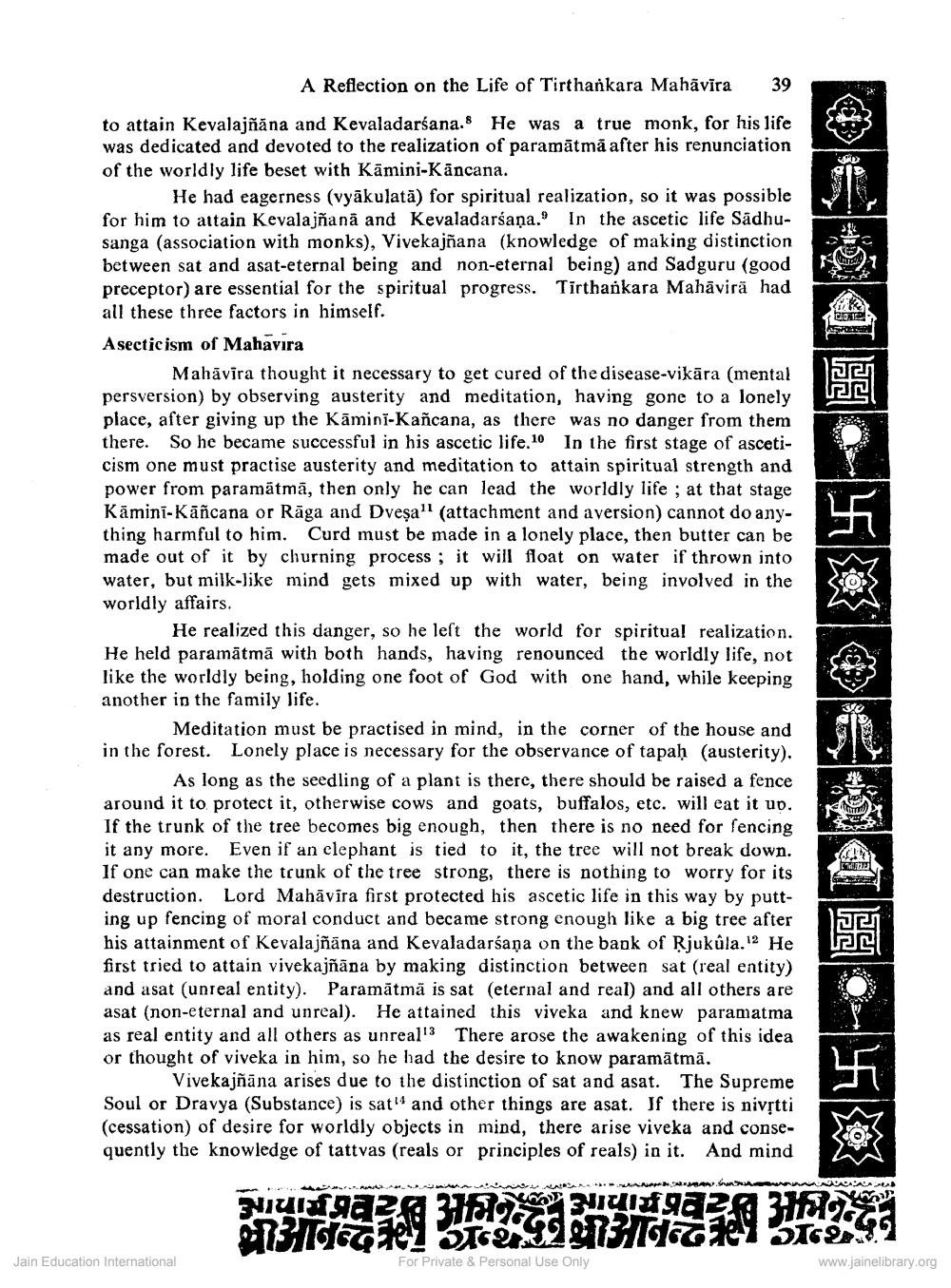Book Title: Reflection on the Life of Mahavira Author(s): J C Sikdar Publisher: Z_Anandrushi_Abhinandan_Granth_012013.pdf View full book textPage 3
________________ A Reflection on the Life of Tirthankara Mahāvīra 39 TECH Sick 20. Jan to attain Kevalajñāna and Kevaladarśana. He was a true monk, for his life was dedicated and devoted to the realization of paramātmā after his renunciation of the worldly life beset with Kāmini-Käncana. He had eagerness (vyākulatā) for spiritual realization, so it was possible for him to attain Kevalajñana and Kevaladarśana. In the ascetic life Sadhusanga (association with monks), Vivekajñana (knowledge of making distinction between sat and asat-eternal being and non-eternal being) and Sadguru (good preceptor) are essential for the spiritual progress. Tirthankara Mahāvirä had all these three factors in himself. Asecticism of Mahavira Mahāvīra thought it necessary to get cured of the disease-vikāra (mental persversion) by observing austerity and meditation, having gone to a lonely place, after giving up the Kāmini-Kancana, as there was no danger from them there. So he became successful in his ascetic life.10 In the first stage of asceticism one must practise austerity and meditation to attain spiritual strength and power from paramātmā, then only he can lead the worldly life ; at that stage Kāmini-Kāñcana or Rāga and Dveşa" (attachment and aversion) cannot do anything harmful to him. Curd must be made in a lonely place, then butter can be made out of it by churning process; it will float on water if thrown into water, but milk-like mind gets mixed up with water, being involved in the worldly affairs. He realized this danger, so he left the world for spiritual realization. He held paramātmā with both hands, having renounced the worldly life, not like the worldly being, holding one foot of God with one hand, while keeping another in the family life. Meditation must be practised in mind, in the corner of the house and in the forest. Lonely place is necessary for the observance of tapaḥ (austerity), As long as the seedling of a plant is there, there should be raised a fence around it to protect it, otherwise cows and goats, buffalos, etc. will eat it up. If the trunk of the tree becomes big enough, then there is no need for fencing it any more. Even if an elephant is tied to it, the tree will not break down. If one can make the trunk of the tree strong, there is nothing to worry for its destruction. Lord Mahāvīra first protected his ascetic life in this way by putting up fencing of moral conduct and became strong enough like a big tree after his attainment of Kevalajñāna and Kevaladarśaņa on the bank of Rjuküla.12 He first tried to attain vivekajñāna by making distinction between sat (real entity) and asat (unreal entity). Paramātmā is sat (eternal and real) and all others are asat (non-eternal and unreal). He attained this viveka and knew paramatma as real entity and all others as unreal! There arose the awakening of this idea or thought of viveka in him, so he had the desire to know paramātmā. Vivekajñāna arises due to the distinction of sat and asat. The Supreme Soul or Dravya (Substance) is sat' and other things are asat. If there is nivịtti (cessation) of desire for worldly objects in mind, there arise viveka and consequently the knowledge of tattvas (reals or principles of reals) in it. And mind CEC an ADNAN ARSALAAAAAAA Nuus2310 S logaz 317 DIET STAG291324 516 Jain Education International For Private & Personal Use Only www.jainelibrary.orgPage Navigation
1 2 3 4 5 6 7 8 9 10 11 12 13 14 15
